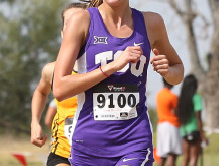Female student athletes often feel like they are being pulled in different directions when it comes to sports and beauty.
“I don’t like women who are: _____” Fill in the blank.
Bulky. Muscly. Big. Broad. Mannish.
If you Google search “Female athletes” and click images, you will have vast options for half naked female athletes. The next three suggestions for related images are: “hot,” “famous” and “thick.”
Female student athletes often deal with the double standard of athleticism vs. beauty.
We are told that to be relevant, we must not only perform our sport well but look good doing it.
And unsurprisingly, this leads to body image issues and problems like eating disorders.
In fact, according to nationaleatingdisorders.com, “Three risk factors are thought to particularly contribute to a female athlete’s vulnerability to developing an eating disorder: social influences emphasizing thinness, performance anxiety and negative self-appraisal of athletic achievement.”
When society only focuses on ‘conventionally’ attractive female athletes, it perpetuates the narrative that people only care about you or your athletic ability if you’re pretty.
Any athlete, regardless of gender, can experience performance anxiety. This anxiety coupled with negative athletic performance (like not achieving a personal best or a loss) can lead to eating disorders.
I’ve experienced this conflict first hand through some of my teammates. The desire to be thin but still be a successful athlete are two opposing forces.
This isn’t to say that female athletes aren’t thin, but when competing at the Division 1 level– you have to eat.
I’ve watched teammates skip meals, or say things like “I don’t deserve food.” I’ve watched them skip reps in the weight room for fear of “becoming too big.” I’ve seen them pass out due to lack of food coupled with the hours of exercise they had done that day. I listened to them fret about their suit sizes and compare their bodies to the ‘perfect’ bodies of Olympians.
It only gets worse if you’re in an “aesthetic sport.”
Female student-athletes in aesthetic sports like dance, gymnastics, cheerleading, swimming and figure skating, have a higher percentage of eating disorders than those in non-aesthetic sports. A study done by Sundgot-Borgen and Torstveit found that female athletes competing in aesthetic sports show higher rates of eating disorder symptoms (42 percent) than are observed in endurance sports (24 percent), technical sports (17 percent) or ball game sports (16 percent).”
During my time at TCU, I and some female athletes met in a seminar to address this issue of body image.
At the beginning, we were told to list the things that society physically considers beautiful. And our list was as hilarious as it was contradictory.
You had to be thin but still thick, take care of yourself but not try too hard, and be athletic but not bulky.
This is the kind of conflict that goes on with female student athletes.
Not even the great Serena Williams has escaped scrutiny surrounding her appearance. Never mind her 23 Singles Grand Slam titles or her Olympic gold medal.
New York Times’ Ben Rothenberg has been quoted saying “Williams…has large biceps and a mold-breaking muscular frame.”
In 2009 Jason Whitlock said Williams was “arguably pushing 175 pounds” and somehow continued to say, “She’d rather eat, and half-ass her way through non-major tournaments.”
Similar things have been said about female athletes particularly in sports like women’s basketball and powerlifting.
Personally, I can say there were times I had to look at my reflection and remind myself that I was an athlete, I had a job to do and food was fuel.
And it might come as a shock to some of those who know me but there were times that looking in the mirror was a struggle.
It can be tough being in a sport that has such a revealing uniform, those swimsuits don’t hide much. And it’s easy to look at the girl next to you or on the team you’re competing against and compare yourself.
So why do female student-athletes continue to starve themselves or sit out on reps? Because there’s this idea that it’s okay to sacrifice some athletic potential because at least you’ll look good doing it.
And there will continue to be this problem until we, as a society, can focus on the deeds of the athlete instead of how she fits into her uniform.




